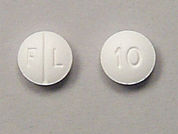Lexapro
Lexapro generic name: Escitalopram Oxalate
What is Lexapro used for?
This medication is used to treat certain mental/mood disorders (such as depression, anxiety). Escitalopram belongs to a class of drugs known as selective serotonin reuptake inhibitors (SSRIs). It works by helping to restore the balance of a certain natural substance (serotonin) in the brain.
CHEMICAL NAME
DRUG TYPE
DepressionLexapro Prices
Searching for the lowest prices
What does Lexapro look like?
View all Lexapro Image Information (3)Lexapro Frequently Asked Questions
Drug interactions may change how your medications work or increase your risk for serious side effects. This document does not contain all possible drug interactions. Keep a list of all the products you use (including prescription/nonprescription drugs and herbal products) and share it with your doctor and pharmacist. Do not start, stop, or change the dosage of any medicines without your doctor's approval.
Some products that may interact with this drug are: other drugs that can cause bleeding/bruising (including antiplatelet drugs such as clopidogrel, NSAIDs such as ibuprofen/naproxen, "blood thinners" such as dabigatran/warfarin).
Aspirin can increase the risk of bleeding when used with this medication. However, if your doctor has told you to take low-dose aspirin to prevent heart attack or stroke (usually 81-162 milligrams a day), you should keep taking the aspirin unless your doctor tells you not to. Ask your doctor or pharmacist for more details.
Taking MAO inhibitors with this medication may cause a serious (possibly fatal) drug interaction. Avoid taking MAO inhibitors (isocarboxazid, linezolid, metaxalone, methylene blue, moclobemide, phenelzine, procarbazine, rasagiline, safinamide, selegiline, tranylcypromine) during treatment with this medication. Most MAO inhibitors should also not be taken for two weeks before and after treatment with this medication. Ask your doctor when to start or stop taking this medication.
The risk of serotonin syndrome/toxicity increases if you are also taking other drugs that increase serotonin. Examples include street drugs such as MDMA/"ecstasy," St. John's wort, certain antidepressants (including other SSRIs such as fluoxetine/paroxetine, SNRIs such as duloxetine/venlafaxine), tryptophan, among others. The risk of serotonin syndrome/toxicity may be more likely when you start or increase the dose of these drugs.
Tell your doctor or pharmacist if you are taking other products that cause drowsiness including alcohol, marijuana (cannabis), antihistamines (such as cetirizine, diphenhydramine), drugs for sleep or anxiety (such as alprazolam, diazepam, zolpidem), muscle relaxants, and opioid pain relievers (such as codeine).
Check the labels on all your medicines (such as allergy, pain/fever reducers, or cough-and-cold products) because they may contain ingredients that cause drowsiness or increase the risk of bleeding. Ask your pharmacist about using those products safely.
Many drugs besides escitalopram may affect the heart rhythm (QT prolongation), including amiodarone, pimozide, procainamide, quinidine, sotalol, among others.
Escitalopram is very similar to citalopram. Do not use medications containing citalopram while using escitalopram.
This medication may interfere with certain medical/lab tests (such as brain scan for Parkinson's disease), possibly causing false test results. Make sure lab personnel and all your doctors know you use this drug.
IMPORTANT: HOW TO USE THIS INFORMATION: This is a summary and does NOT have all possible information about this product. This information does not assure that this product is safe, effective, or appropriate for you. This information is not individual medical advice and does not substitute for the advice of your health care professional. Always ask your health care professional for complete information about this product and your specific health needs.


